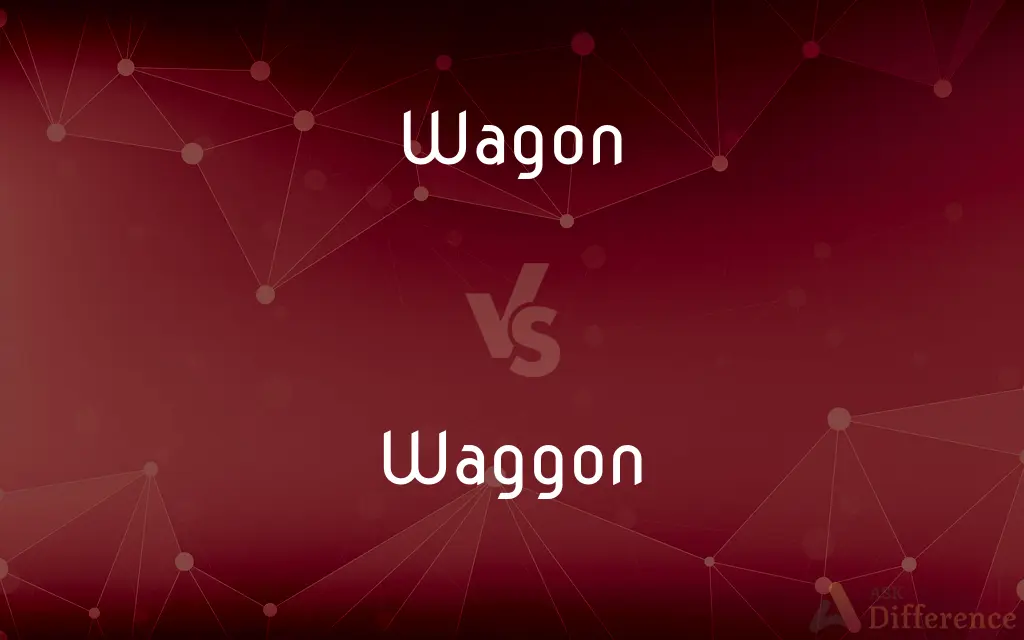Wagon vs. Waggon — What's the Difference?
By Fiza Rafique & Urooj Arif — Updated on April 7, 2024
A wagon is a four-wheeled vehicle for transporting goods or people, primarily in American English, while "waggon" is its British English counterpart, reflecting regional spelling differences.

Difference Between Wagon and Waggon
Table of Contents
ADVERTISEMENT
Key Differences
A wagon typically refers to a four-wheeled vehicle designed for hauling goods or sometimes passengers, mainly used in American English. On the other hand, "waggon" is essentially the same type of vehicle but is the preferred spelling in British English, showcasing a variation in English language dialects.
Wagons are often associated with historical contexts in the United States, such as the covered wagons used during westward expansion. Whereas, in British English, "waggon" might also evoke images of railway goods vehicles, reflecting the term's broader usage in historical and modern contexts within the UK.
In contemporary American English, the term "wagon" can also colloquially refer to a station wagon, a car model with a rear cargo area. Meanwhile, British English does not typically use "waggon" in this context, illustrating a divergence in modern usage.
The spelling "wagon" is widely recognized and used in international contexts, often adopted in technical and commercial language. In contrast, "waggon" remains more localized to British English, indicating a preference that aligns with regional spelling conventions.
In digital communication and documentation, the shorter spelling "wagon" is more commonly adopted, emphasizing efficiency and a move towards simplified language. On the other hand, "waggon" preserves traditional spelling, reflecting an adherence to historical linguistic practices.
ADVERTISEMENT
Comparison Chart
Spelling
Wagon
Waggon
Region
Primarily American English
Primarily British English
Usage in Transport
Used for goods and people; also refers to a station wagon
Used for goods; historical railway usage
Modern Usage
Colloquial and technical contexts, favoring simplified spelling
More localized, preserving traditional spelling
Association
Historical American westward expansion, modern vehicles
British railway history, less common in modern vehicles
Compare with Definitions
Wagon
In idiomatic usage, committing to a cause or effort.
He’s back on the wagon, avoiding junk food.
Waggon
Less commonly, a large motor vehicle for freight.
The company used a waggon for its delivery services.
Wagon
A term for station wagons in modern American English.
They drove their wagon to the beach for a day out.
Waggon
Historically, a heavy four-wheeled vehicle.
The museum displayed an ancient waggon used in mining.
Wagon
A four-wheeled vehicle for transporting goods.
The farmer loaded hay onto the wagon.
Waggon
Refers to railway vehicles for freight in British English.
A goods waggon derailed outside the city.
Wagon
A child's toy vehicle, often pulled by a handle.
The child pulled her teddy bear in a small red wagon.
Waggon
British spelling for a vehicle, especially for transporting goods.
The old waggon was parked beside the barn.
Wagon
A vehicle designed for carrying people, historically covered.
Pioneers traveled west in a covered wagon.
Waggon
Preserves traditional British English spelling in literature.
The novel mentioned a waggon rolling through the countryside.
Wagon
A wagon or waggon is a heavy four-wheeled vehicle pulled by draught animals or on occasion by humans, used for transporting goods, commodities, agricultural materials, supplies and sometimes people. Wagons are immediately distinguished from carts (which have two wheels) and from lighter four-wheeled vehicles primarily for carrying people, such as carriages.
Waggon
Variant of wagon.
Wagon
A vehicle used for transporting goods or another specified purpose
A breakdown wagon
A timber wagon
Waggon
(Britain) wagon
Wagon
An unpleasant or disliked woman.
Waggon
(UK) wagon
Wagon
A four-wheeled, usually horse-drawn vehicle with a large rectangular body, used for transporting loads.
Waggon
Any of various kinds of wheeled vehicles drawn by a horse or tractor
Wagon
A light automotive transport or delivery vehicle.
Waggon
A car that has a long body and rear door with space behind rear seat
Wagon
A station wagon.
Wagon
A police patrol wagon.
Wagon
A child's low, four-wheeled cart hauled by a long handle that governs the direction of the front wheels.
Wagon
A small table or tray on wheels used for serving drinks or food
A dessert wagon.
Wagon
Wagon The Big Dipper
Wagon
Chiefly British An open railway freight car.
Wagon
To transport or undergo transportation by wagon.
Wagon
A heavier four-wheeled (normally horse-drawn) vehicle designed to carry goods (or sometimes people).
Wagon
Abbreviation of toy wagon; A child's riding toy, with the same structure as a wagon (sense 1), pulled or steered by a long handle attached to the front.
Wagon
(rail) A vehicle (wagon) designed to transport goods or people on railway.
Wagon
(slang) transporting]] prisoners
Wagon
; (by extension) a sport utility vehicle (SUV); any car.
Wagon
A woman of loose morals, a promiscuous woman, a slapper; (by extension) a woman regarded as obnoxious; a bitch, a cow.
Thesaurus:promiscuous woman
Wagon
(math) A kind of prefix used in de Bruijn notation.
Wagon
(slang) Buttocks.
Wagon
To load into a wagon in preparation for transportation; to transport by means of a wagon.
Wagon
To travel in a wagon.
Wagon
A wheeled carriage; a vehicle on four wheels, and usually drawn by horses; especially, one used for carrying freight or merchandise.
Wagon
A freight car on a railway.
Wagon
A chariot
Wagon
The Dipper, or Charles's Wain.
Wagon
To transport in a wagon or wagons; as, goods are wagoned from city to city.
Wagon
To wagon goods as a business; as, the man wagons between Philadelphia and its suburbs.
Wagon
Any of various kinds of wheeled vehicles drawn by a horse or tractor
Wagon
Van used by police to transport prisoners
Wagon
A group of seven bright stars in the constellation Ursa Major
Wagon
A child's four-wheeled toy cart sometimes used for coasting
Wagon
A car that has a long body and rear door with space behind rear seat
Common Curiosities
Why does American English prefer "wagon" over "waggon"?
American English often adopts simplified spellings, hence the preference for "wagon."
Is "wagon" used in digital communication more than "waggon"?
Yes, due to its simplified spelling and broader recognition.
Are wagons and waggons only historical?
No, they still refer to contemporary vehicles, though "wagon" has broader modern usage including station wagons in American English.
Do children's toys use one spelling over the other?
In English-speaking countries, "wagon" is the common term for a child's toy vehicle.
Can both terms refer to vehicles used in railways?
Yes, but "waggon" is more specifically associated with railway goods vehicles in British English.
What is the main difference between a wagon and a waggon?
The main difference is spelling and regional usage, with "wagon" being preferred in American English and "waggon" in British English.
Can "wagon" be used figuratively?
Yes, it can refer to committing to a cause or effort, as in "on the wagon."
Are there vehicles that are exclusively called "wagons" or "waggons"?
Station wagons are exclusively referred to as "wagons," especially in American English.
Has the spelling "waggon" been entirely replaced by "wagon"?
No, "waggon" is still used, particularly in British English and in specific historical or railway contexts.
Is there a difference in pronunciation between wagon and waggon?
Generally, no, both terms are pronounced similarly despite the spelling difference.
Does "waggon" appear in modern British literature?
Yes, it preserves traditional spelling and is used in literary contexts.
Do "wagon" and "waggon" have the same technical specifications?
Yes, when referring to the same type of vehicle, their technical specifications would be the same.
Which term is more common in global English?
"Wagon" is more widely used in global English due to its simplicity and American English's broad influence.
Why might someone choose to use "waggon" in writing?
To adhere to British English spelling conventions or evoke a historical or regional tone.
How does the use of "wagon" reflect historical American culture?
It evokes images of westward expansion and pioneering spirit.
Share Your Discovery

Previous Comparison
Fisherman vs. Fisherwoman
Next Comparison
Organ vs. GlandAuthor Spotlight
Written by
Fiza RafiqueFiza Rafique is a skilled content writer at AskDifference.com, where she meticulously refines and enhances written pieces. Drawing from her vast editorial expertise, Fiza ensures clarity, accuracy, and precision in every article. Passionate about language, she continually seeks to elevate the quality of content for readers worldwide.
Co-written by
Urooj ArifUrooj is a skilled content writer at Ask Difference, known for her exceptional ability to simplify complex topics into engaging and informative content. With a passion for research and a flair for clear, concise writing, she consistently delivers articles that resonate with our diverse audience.















































